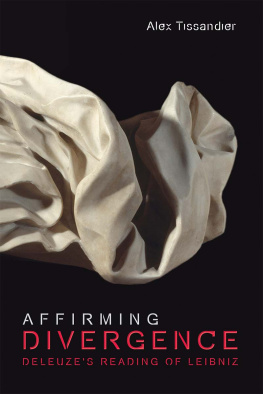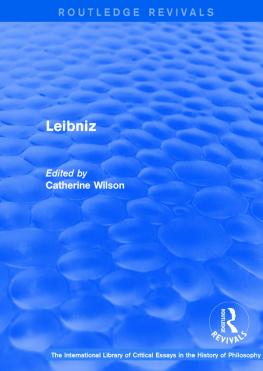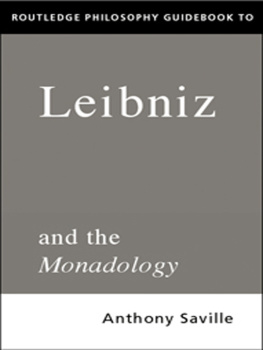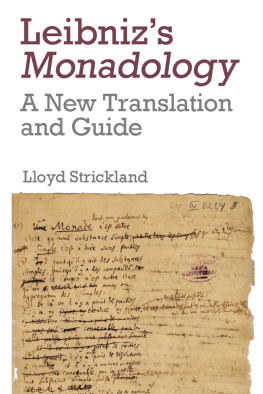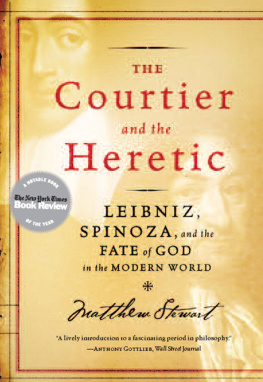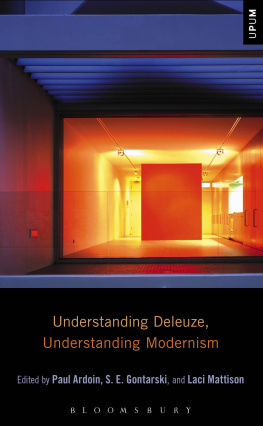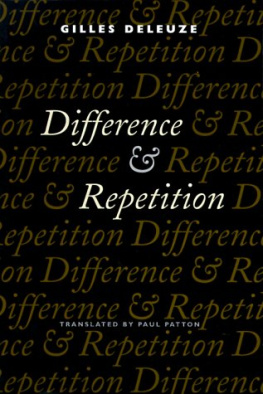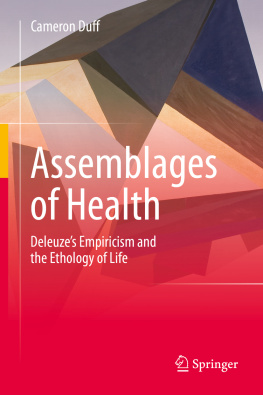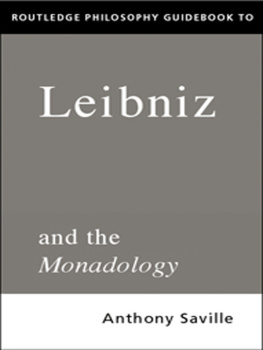Alex Tissandier - Affirming Divergence: Deleuzes Reading of Leibniz
Here you can read online Alex Tissandier - Affirming Divergence: Deleuzes Reading of Leibniz full text of the book (entire story) in english for free. Download pdf and epub, get meaning, cover and reviews about this ebook. year: 2017, publisher: Edinburgh University Press, genre: Religion. Description of the work, (preface) as well as reviews are available. Best literature library LitArk.com created for fans of good reading and offers a wide selection of genres:
Romance novel
Science fiction
Adventure
Detective
Science
History
Home and family
Prose
Art
Politics
Computer
Non-fiction
Religion
Business
Children
Humor
Choose a favorite category and find really read worthwhile books. Enjoy immersion in the world of imagination, feel the emotions of the characters or learn something new for yourself, make an fascinating discovery.
- Book:Affirming Divergence: Deleuzes Reading of Leibniz
- Author:
- Publisher:Edinburgh University Press
- Genre:
- Year:2017
- Rating:4 / 5
- Favourites:Add to favourites
- Your mark:
- 80
- 1
- 2
- 3
- 4
- 5
Affirming Divergence: Deleuzes Reading of Leibniz: summary, description and annotation
We offer to read an annotation, description, summary or preface (depends on what the author of the book "Affirming Divergence: Deleuzes Reading of Leibniz" wrote himself). If you haven't found the necessary information about the book — write in the comments, we will try to find it.
Affirming Divergence: Deleuzes Reading of Leibniz — read online for free the complete book (whole text) full work
Below is the text of the book, divided by pages. System saving the place of the last page read, allows you to conveniently read the book "Affirming Divergence: Deleuzes Reading of Leibniz" online for free, without having to search again every time where you left off. Put a bookmark, and you can go to the page where you finished reading at any time.
Font size:
Interval:
Bookmark:

AFFIRMING DIVERGENCE
Deleuzes Reading of Leibniz

Alex Tissandier

Edinburgh University Press is one of the leading university presses in the UK. We publish academic books and journals in our selected subject areas across the humanities and social sciences, combining cutting-edge scholarship with high editorial and production values to produce academic works of lasting importance. For more information visit our website: edinburghuniversitypress.com
Alex Tissandier, 2018
Edinburgh University Press Ltd
The Tun Holyrood Road
12(2f) Jacksons Entry
Edinburgh EH8 8PJ
A CIP record for this book is available from the British Library
ISBN 978 1 4744 1776 1
The right of Alex Tissandier to be identified as the author of this work has been asserted in accordance with the Copyright, Designs and Patents Act 1988, and the Copyright and Related Rights Regulations 2003 (SI No. 2498).
This book is the result of postgraduate research at the University of Warwick. I am very grateful to have been immersed in the unique mix of Deleuzian ideas which animated the philosophy department throughout my time there. My thanks to Miguel de Beistegui, Keith Ansell-Pearson and Stephen Houlgate for making such an atmosphere possible.
My biggest thanks to my fellow researchers especially Stephen Barrell, Benjamin Berger, Justin Laleh and Peter Wolfendale for countless hours of intense discussion, shared confusion, and ambitious reading groups (a few of which even made it past the first chapter).
Thanks to Henry Somers-Hall and Beth Lord for their comments on the first draft, and to the staff and editors at EUP.
Dedicated to my parents for their unwavering, enthusiastic support.
| DR | Gilles Deleuze, Difference and Repetition. |
| EPS | Gilles Deleuze, Expressionism in Philosophy: Spinoza. |
| LE | Gilles Deleuze, Review of Jean Hyppolites Logic et Existence. |
| LS | Gilles Deleuze, Logic of Sense. |
| LP | Gilles Deleuze, Le Pli. |
| PPL | Leibniz, Philosophical Papers and Letters. |
Plateaus New Directions in Deleuze Studies
Its not a matter of bringing all sorts of things together under a single concept but rather of relating each concept to variables that explain its mutations.
Gilles Deleuze, Negotiations
Series Editors
Ian Buchanan, University of Wollongong
Claire Colebrook, Penn State University
Editorial Advisory Board
Keith Ansell Pearson, Ronald Bogue, Constantin V. Boundas, Rosi Braidotti, Eugene Holland, Gregg Lambert, Dorothea Olkowski, Paul Patton, Daniel Smith, James Williams
Titles available in the series
Christian Kerslake, Immanence and the Vertigo of Philosophy: From Kant to Deleuze
Jean-Clet Martin, Variations: The Philosophy of Gilles Deleuze, translated by Constantin V. Boundas and Susan Dyrkton
Simone Bignall, Postcolonial Agency: Critique and Constructivism
Miguel de Beistegui, Immanence Deleuze and Philosophy
Jean-Jacques Lecercle, Badiou and Deleuze Read Literature
Ronald Bogue, Deleuzian Fabulation and the Scars of History
Sean Bowden, The Priority of Events: Deleuzes Logic of Sense
Craig Lundy, History and Becoming: Deleuzes Philosophy of Creativity
Aidan Tynan, Deleuzes Literary Clinic: Criticism and the Politics of Symptoms
Thomas Nail, Returning to Revolution: Deleuze, Guattari and Zapatismo
Franois Zourabichvili, Deleuze: A Philosophy of the Event with The Vocabulary of Deleuze edited by Gregg Lambert and Daniel W. Smith, translated by Kieran Aarons
Frida Beckman, Between Desire and Pleasure: A Deleuzian Theory of Sexuality
Nadine Boljkovac, Untimely Affects: Gilles Deleuze and an Ethics of Cinema Daniela Voss, Conditions of Thought: Deleuze and Transcendental Ideas
Daniel Barber, Deleuze and the Naming of God: Post-Secularism and the Future of Immanence
F. LeRon Shults, Iconoclastic Theology: Gilles Deleuze and the Secretion of Atheism
Janae Sholtz, The Invention of a People: Heidegger and Deleuze on Art and the Political
Marco Altamirano, Time, Technology and Environment: An Essay on the Philosophy of Nature
Sean McQueen, Deleuze and Baudrillard: From Cyberpunk to Biopunk
Ridvan Askin, Narrative and Becoming
Marc Rlli, Gilles Deleuzes Transcendental Empiricism: From Tradition to Difference translated by Peter Hertz-Ohmes
Guillaume Collett, The Psychoanalysis of Sense: Deleuze and the Lacanian School
Ryan J. Johnson, The Deleuze-Lucretius Encounter
Allan James Thomas, Deleuze, Cinema and the Thought of the World
Cheri Lynne Carr, Deleuzes Kantian Ethos: Critique as a Way of Life
Alex Tissandier, Affirming Divergence: Deleuzes Reading of Leibniz
Forthcoming volumes
Justin Litaker, Deleuze and Guattaris Political Economy
Nir Kedem, A Deleuzian Critique of Queer Thought: Overcoming Sexuality
Felice Cimatti, Becoming-animal: Philosophy of Animality After Deleuze, translated by Fabio Gironi
Visit the Plateaus website at edinburghuniversitypress.com/series/plat
References to Leibnizs philosophy appear constantly throughout Deleuzes work. Despite often repeating the same themes, we find marked differences in tone, as if Deleuze is unable to arrive at a conclusive judgement. This book explores these various engagements and tries to account for these shifts in tone. Ultimately it will argue that focusing on Deleuzes interpretation of Leibniz both his appropriations and his criticisms helps us to understand some key moments in Deleuzes own philosophical development. A close reading, emphasising the particular context and terminology of Leibnizs work, will open a narrow point of access into some of the most difficult areas of Deleuzes philosophy. In the course of this reading, it will become clear that it is precisely Leibnizs ambiguous status for Deleuze which makes an investigation into their relationship so fruitful: by not only explaining Leibnizs positive influence, but also pinpointing the precise grounds for their eventual divergence, we hope to better articulate some of Deleuzes own philosophical priorities.
Any close reading must thus begin by taking this ambiguous status seriously. There are two opposing tendencies that allow us to identify two distinct sides to Leibnizs philosophy, or indeed, the presence of two distinct Leibnizes, in Deleuzes readings. Leibniz, in fact, is not unused to undergoing such partitions. The first biography of Leibniz, in a eulogy by Bernard Fontenelle (the secretary of the Acadmie des Sciences in Paris upon Leibnizs death), likens his propensity for broad study to a charioteer expertly managing each of his horses. Fontenelles eulogy insists that we decompose and make many geniuses out of one Leibniz, a maxim which has generally set the standard for later scholarship. But where traditionally the lines of Leibnizs decomposition have been drawn according to discipline (Leibniz the philosopher, Leibniz the logician, Leibniz the mathematician, and so on), in Deleuzes reading we find Leibniz split by two opposing tendencies that are not only philosophical but also theological, moral and political.
Next pageFont size:
Interval:
Bookmark:
Similar books «Affirming Divergence: Deleuzes Reading of Leibniz»
Look at similar books to Affirming Divergence: Deleuzes Reading of Leibniz. We have selected literature similar in name and meaning in the hope of providing readers with more options to find new, interesting, not yet read works.
Discussion, reviews of the book Affirming Divergence: Deleuzes Reading of Leibniz and just readers' own opinions. Leave your comments, write what you think about the work, its meaning or the main characters. Specify what exactly you liked and what you didn't like, and why you think so.

